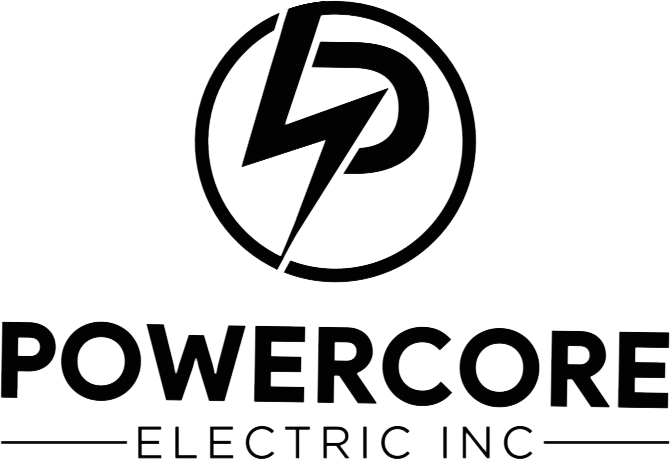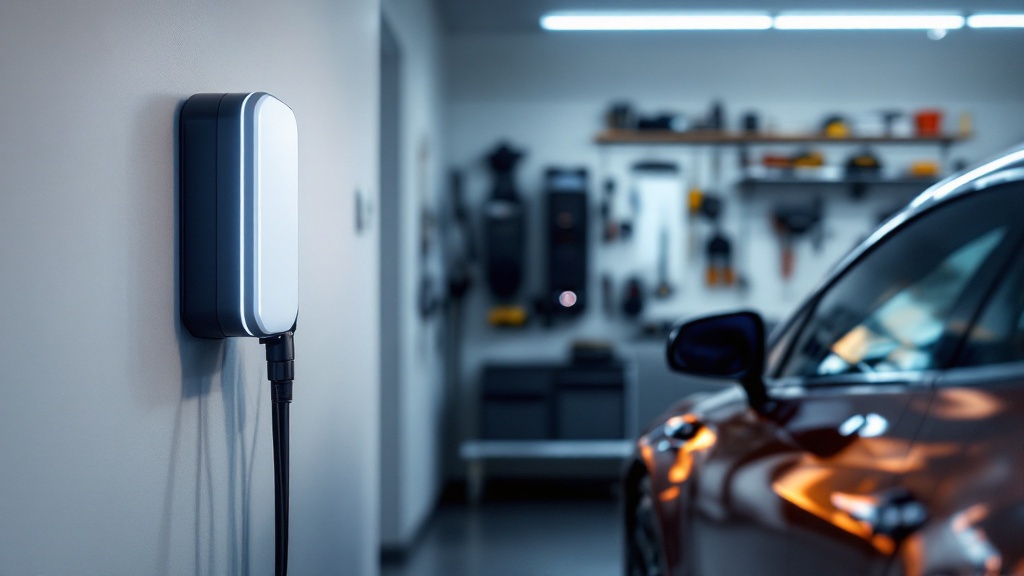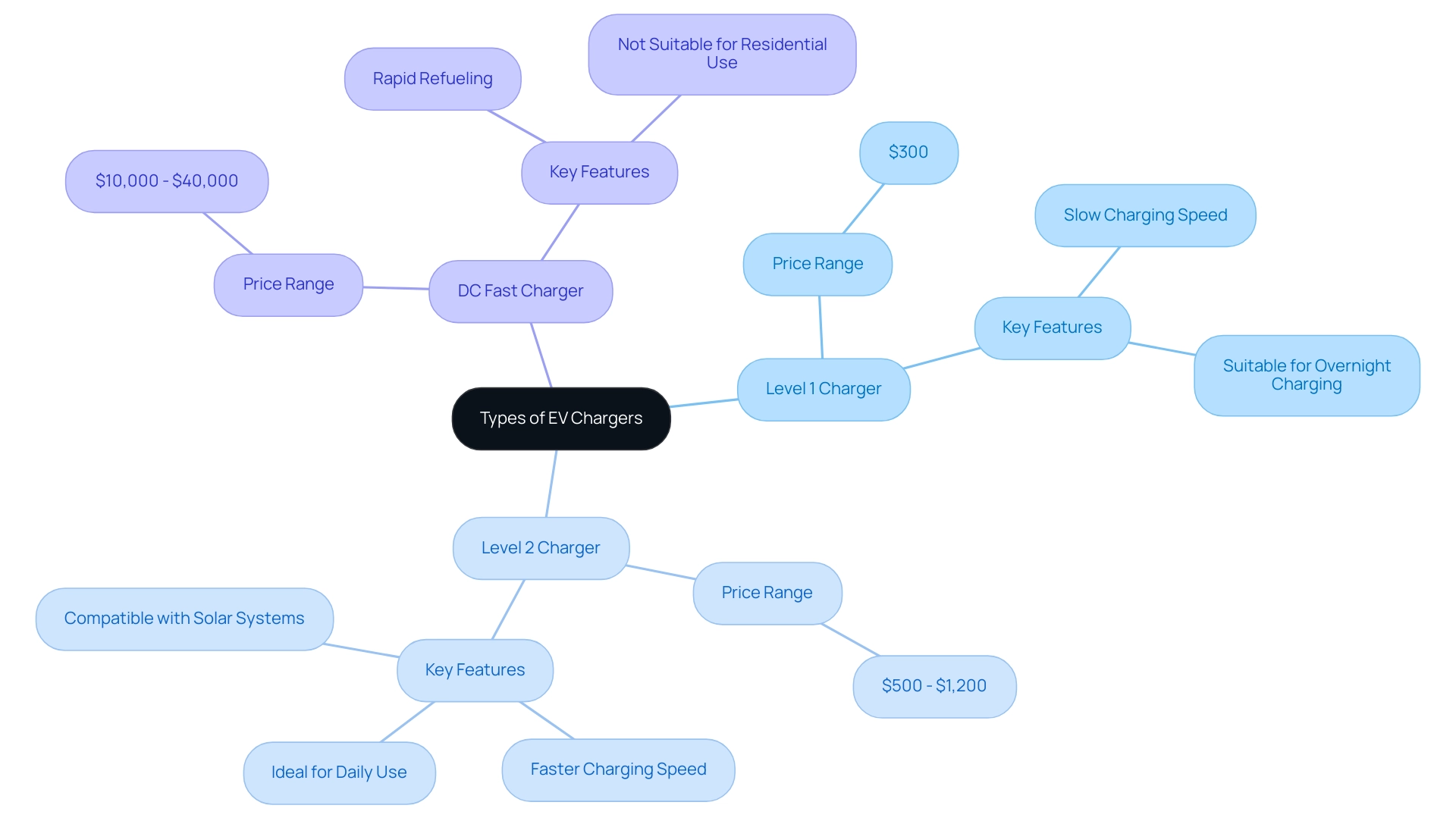Introduction
Navigating the world of electric vehicle (EV) ownership can feel overwhelming, especially when it comes to understanding the costs associated with charging solutions. From the initial purchase of a charger to installation expenses and ongoing electricity costs, potential EV owners have a lot to consider.
This guide delves into the various types of chargers available, their price ranges, and the incentives that can help ease the financial burden. Homeowners will discover the benefits of charging at home versus relying on public stations, as well as how integrating solar energy can further enhance savings.
With the right information, making the switch to electric can be not only feasible but also financially rewarding.
Understanding the Costs of Electric Vehicle Chargers
When considering electric vehicle (EV) charging devices, prospective owners should be mindful of the cost of EV chargers along with the different expenses involved. The cost of an EV charger usually ranges from $300 to $1,200, with the final amount primarily relying on the type and features selected. The cost of EV charger installation is another factor to consider, contributing an additional layer of expense that usually ranges from $500 to $2,000.
This variation is influenced by factors like necessary electrical upgrades and labor expenses. In states where Q1’24 prices were below $0.40, prices rose by an average of 11%, compared to a 1% increase in states above $0.40, highlighting the importance of understanding regional pricing dynamics. As Voelcker notes, ‘The cheapest way to charge your electric car is almost always at home, overnight,’ and some utilities offer special low rates during these periods when demand is lightest.
It’s crucial for homeowners to fully understand the cost of EV chargers and other expenses as they reflect the total financial commitment associated with welcoming an EV into their lives. For those interested in installation, Powercore Electric Inc. provides a comprehensive suite of services, including solar panel setups, battery backups, and EV power stations. Their experienced team guides you through the installation process, ensuring compliance with local regulations and maximizing your home’s energy efficiency.
They also assist homeowners in navigating government programs that provide incentives for energy-efficient upgrades. Furthermore, charging expenses are estimated based on the average electricity rates and the usable battery capacity of various EV models, such as the Nissan Leaf and Ford Mustang Mach-E. By considering long-term savings on fuel and maintenance alongside these calculations, you’ll gain a clearer and more encouraging financial picture when making the switch to electric. For more information, feel free to reach out to Powercore Electric at ryan.serrano@powercoreinc.net or call (916) 699-8778.
Types of EV Chargers and Their Price Ranges
When it comes to EV charging stations, homeowners have three main options: Level 1, Level 2, and DC Fast options. Level 1 devices are the simplest choice, as they can be plugged into standard household outlets and the cost of EV charger is typically around $300. However, they power your vehicle slowly, often requiring overnight replenishment to achieve a full battery.
If you’re seeking something that aligns better with your daily routine, Level 2 devices are a popular option for home setups. The cost of EV charger, priced between $500 and $1,200, significantly reduces charging time, making them ideal for daily use and perfectly complementing your solar panel system from Powercore Electric Inc. Additionally, Powercore Electric Inc. offers solar battery backups that can enhance your energy efficiency and provide dependable power for your EV charging station. On the other hand, the cost of EV charger for DC Fast Chargers, which you’ll mostly find in commercial settings, ranges from $10,000 to $40,000.
While these chargers offer rapid refueling, they’re not typically a fit for residential setups. It’s also important to consider that operating a gas-powered car requires around $1,600 to $2,100 each year, which can be significantly lowered by transitioning to an electric vehicle. As Electrify America observes, ‘This is an ongoing process and we look forward to further developments that may enable us to offer EV refueling on a per-kWh basis throughout the rest of the states.’
Furthermore, although public EV refueling can be convenient, it may result in high yearly expenses, with the cost of EV charger fees for a complete fill on a 40kW battery varying from $8 to $10 for Level 2 refueling and $16 to $24 for Fast DC refueling, potentially reaching up to $2,300 annually if depended on exclusively. Moreover, homeowners ought to investigate existing government initiatives and incentives that can help with the cost of EV charger installation, making the shift to electric transportation more economical. By grasping these alternatives and the related expenses, and evaluating the advantages of Powercore Electric Inc.’s solar battery backups and EV power stations, you can better match your EV energy requirements with your budget, ensuring a smooth shift to electric automobile ownership.
Ongoing Costs: Electricity and Maintenance for EV Chargers
When it comes to owning an electric auto, understanding the ongoing expenses related to the cost of EV charger is crucial for effective budgeting. On average, the electricity expense for replenishing an EV in 2024 hovers around $0.13 per kWh, meaning that fully energizing your automobile can set you back about $5 to $10, depending on the size of your car’s battery. For instance, the 2024 Hummer EV SUT has a claimed range of 381 miles, illustrating how power expenses can relate to range.
That’s quite a deal compared to the $1,600 to $2,100 you’d spend annually on gas for a traditional car covering the same distance! However, it’s essential to consider that free public charging stations may have long lines and frequent outages, making them an unreliable option. Maintenance expenses for electric vehicle charging stations are usually low and require minimal care, but it is wise to budget for some additional funds for possible repairs or enhancements, especially when considering the cost of EV charger.
If your home’s electrical system needs enhancements to support your charger, Powercore Electric offers a comprehensive installation process that includes:
- Site assessments
- Necessary electrical upgrades such as panel enhancements and wiring adjustments
- Thorough testing to ensure everything runs smoothly
Moreover, grasping solar panel functionality is essential, as combining solar energy with your EV charging system can further lower expenses and environmental impact. For efficient energy storage, consider options like the Tesla Powerwall or LG Chem RESU, which are among the best solar battery choices available, allowing you to store excess solar energy for later use.
As Marc Urbano from Car and Driver notes, ‘We picked the Model Y because it’s currently the bestselling electric vehicle in North America,’ highlighting the growing interest in EV ownership. By staying informed about these ongoing expenses and exploring options like solar energy and efficient battery storage, you can enjoy the benefits of driving an EV without any unpleasant surprises along the way.
Incentives and Rebates: Reducing the Cost of EV Charger Installation
Many states and local authorities are increasing efforts to assist eco-conscious homeowners by providing attractive incentives and rebates for EV installation, which significantly lowers the cost of EV charger expenses. For example, California leads the charge with rebates of up to $1,000 for eligible home installations through the California Electric Vehicle Infrastructure Project. Wyoming residents can also benefit from a $500 rebate when purchasing and installing a Level 2 charging station.
Additionally, Dakota Electric Association offers rebates of up to $500 for installing a Level 2 device, easing the financial burden. As highlighted by Ruth Celestin from AdvisE:
- “Customers can receive up to $500 for a new EV charger and up to $500 more for any wiring upgrades,” emphasizing the financial support available.
Don’t forget about potential federal tax credits that homeowners may qualify for, allowing them to claim a percentage of installation costs on their taxes.
By exploring these financial incentives, the cost of EV chargers makes transitioning to electric vehicles a more affordable and appealing investment in sustainable energy solutions that benefit both your home and the environment. Remember, EV refueling is easier than you think! If you’re interested in making this transition, feel free to contact Powercore Electric Inc. for expert services in solar panels, battery backups, and EV power stations.
Contact us at ryan.serrano@powercoreinc.net or call (916) 699-8778 today!
Home Charging vs. Public Charging: A Cost Comparison
For eco-conscious homeowners navigating the realm of electric vehicle (EV) power supply, a key decision is whether to power at home or depend on public stations. Generally, the cost of EV charger at home is the more affordable option, with expenses ranging from $5 to $10 for a complete refill, in sharp contrast to public power stations, where the cost can differ significantly, often falling between $10 and $15 per complete refill. Comprehending these financial dynamics allows EV owners to make informed decisions regarding their energy usage.
For example, the Tesla Model Y Long Range, which needs 38.0 kWh to cover 100 miles, incurs highway expenses between $13.68 and $20.90 when utilizing Supercharging, with charges varying from $0.36 to $0.55 per kWh. This makes home charging the more budget-friendly alternative due to the cost of EV charger. Moreover, considering that operating a gas-powered vehicle for the same distance would amount to approximately $1,600 to $2,100 annually, the savings potential of EV ownership becomes evident.
Additionally, the cost of an EV charger installation at home typically ranges from $1,000 to $2,500, depending on the complexity of the setup and any necessary electrical upgrades. Powercore Electric also offers solar panel installations and battery backup solutions, which can further enhance your home’s energy efficiency and sustainability. As one satisfied customer, Amy R., puts it, ‘Highly recommend!!
Exceptional service and price. Tom was very helpful, a really nice straightforward guy who definitely cares about his clients.’ If you’re ready to embrace a cleaner, more sustainable future, contact Powercore Electric today to learn more about our EV charging solutions, installation costs, and how we can assist you in making the switch!
Conclusion
Understanding the costs associated with electric vehicle chargers is crucial for anyone considering the switch to an EV. From the initial purchase price of chargers to installation expenses and ongoing electricity costs, there are multiple factors to weigh. Homeowners can choose between various charger types, including:
- Level 1
- Level 2
- DC Fast Chargers
Each type has its own price range and charging capabilities. By opting for home charging, significant savings can be realized compared to public charging stations, making it a more economical choice in the long run.
Moreover, the potential for incentives and rebates from local and federal programs can ease the financial burden of installation, making this transition not only feasible but also attractive. Integrating solar energy into your charging setup further enhances savings and aligns with a sustainable lifestyle. With low ongoing maintenance costs and the promise of reduced fuel expenses, the financial picture for EV ownership becomes increasingly encouraging.
In summary, transitioning to an electric vehicle is a rewarding commitment that offers both environmental benefits and financial savings. By arming oneself with knowledge about charger types, ongoing costs, and available incentives, homeowners can confidently navigate their journey toward sustainable transportation. Making the switch to electric is not just an investment in a vehicle; it’s a step toward a cleaner, greener future.



